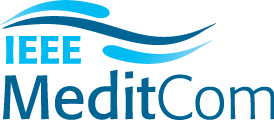Tuesday 6 September 2022, 11:00 – 12:30
Gunnar Peters, Senior Expert, Huawei, Sweden
Talk title: Large Antenna Systems in Real Life
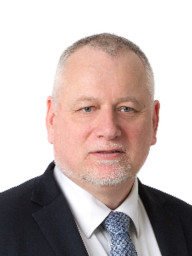
Abstract: Large antenna system solutions like Distributed Massive MIMO (DMIMO) are predicted to give spectral efficiency gains of several hundred percent, using the spatial resolution made available by such systems. However, these gains are dependent on the solution of some fundamental problems, some related to implementations and some of more general nature. In this talk, we discuss these problems and present possibe solutions.
Bio: Gunnar Peters is a Senior Expert in Network Algorithms at Huawei Sweden. He has a Ph.D. in Mathematics and Master of Engineering in Applied Physics from the Royal Institute of Technology. He has worked in telecom for 19 years and started at Ericsson in 2000, where he was an expert in Radio Performance. In 2010 he joined the Wireless organization at Huawei Sweden, where he leads a group developing radio network algorithms. Gunnar has also worked at the University of South Carolina, Uppsala University, and the Royal Institute of Technology. His research covers stochastic analysis, quantum field theory, wavelet analysis, computational solid state mechanics, signal processing, and radio resource management
Yonina Eldar, Weizmann Institute of Science, Rehovot, Israel
Talk title: Communication and Sensing: From Compressed Sampling to Model-based Deep Learning

Abstract: The famous Shannon-Nyquist theorem has become a landmark in analog-to-digital conversion and the development of digital signal processing algorithms. However, in many modern applications, the signal bandwidths have increased tremendously, while the acquisition capabilities have not scaled sufficiently fast. Furthermore, the resulting high rate digital data requires storage, communication and processing at very high rates, which is computationally expensive and requires large amounts of power. In this talk, we consider a general framework for communication and sensing including sub-Nyquist sampling, quantization and processing in space, time and frequency which allows to dramatically reduce the number of antennas, sampling rates, number of bits, and band occupancy in a variety of applications. Our framework relies on exploiting signal structure, quantization and the processing task in both standard processing and in deep learning networks leading to a new framework for model-based deep learning. It also allows for the development of efficient joint radar-communication systems and near-field processing. We consider applications of these ideas to a variety of problems in wireless communications, imaging, massive MIMO systems, automotive radar and ultrasound imaging and show several demos of real-time prototypes including a wireless ultrasound probe, sub-Nyquist automotive radar, cognitive radio and radar, dual radar-communication systems, analog precoding, sparse antenna arrays, and a deep Viterbi decoder. We end by discussing more generally how models can be used in deep learning methods with application to a variety of communication settings.
Bio: Yonina Eldar is a Professor in the Department of Mathematics and Computer Science, Weizmann Institute of Science, Rehovot, Israel, where she heads the center for biomedical engineering. She is also a Visiting Professor at MIT, a Visiting Scientist at the Broad Institute, and an Adjunct Professor at Duke University, and she was a Visiting Professor at Stanford. She is a member of the Israel Academy of Sciences and Humanities, an IEEE Fellow, and a EURASIP Fellow. She has received many awards for excellence in research and teaching, including the IEEE Signal Processing Society Technical Achievement Award (2013), the IEEE/AESS Fred Nathanson Memorial Radar Award (2014), and the IEEE Kiyo Tomiyasu Award (2016). She was a Horev Fellow of the Leaders in Science and Technology program at the Technion and an Alon Fellow. She received the Michael Bruno Memorial Award from the Rothschild Foundation, the Weizmann Prize for Exact Sciences, the Wolf Foundation Krill Prize for Excellence in Scientific Research, the Henry Taub Prize for Excellence in Research (twice), the Hershel Rich Innovation Award (three times), the Award for Women with Distinguished Contributions, and several teaching awards. She was selected as one of the 50 most influential women in Israel, and was a member of the Israel Committee for Higher Education. She is the Editor-in-Chief of Foundations and Trends in Signal Processing and heads the committee for Gender Fairness in Higher Education Institutions in Israel.
Wednesday 7 September 2022, 11:00 – 12:30
Marco Di Renzo, L2S-CentraleSupelec, Paris-Saclay University, France
Talk title: Reconfigurable Intelligent Surfaces for Wireless Communications
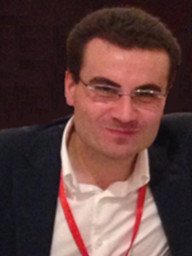
Abstract: A Reconfigurable Intelligent Surface (RIS) is a planar structure that is engineered to have properties that enable the dynamic control of the electromagnetic waves. In wireless communications and networks, RISs are an emerging technology for realizing programmable and reconfigurable wireless propagation environments through nearly passive and tunable signal transformations. RIS-assisted programmable wireless environments are a multidisciplinary research endeavor. This presentation is aimed to report the latest research advances on modeling, analyzing, and optimizing RISs for wireless communications with focus on electromagnetically consistent models, analytical frameworks, and optimization algorithms. In addition, the interplay between RISs and holographic surface-based transceivers will be discussed with focus on near-field communications in line-of-sight channels.
Bio: Marco Di Renzo is a CNRS Research Director (Professor) with the Laboratory of Signals and Systems (L2S) of Paris-Saclay University – CNRS and CentraleSupelec, Paris, France. He serves as the Coordinator of the Communications and Networks Research Area of the Laboratory of Excellence DigiCosme, as a Member of the Admission and Evaluation Committee of the Ph.D. School on
Information and Communication Technologies, and as the Head of the Intelligent Physical Communications group with the Laboratory of Signals and Systems at CentraleSupelec. He serves as the Editor-in-Chief of IEEE Communications Letters, he is a founding member and a Vice Chair of the Industry Specification Group (ISG) on RIS within the European Telecommunications Standards Institute (ETSI), and he serves as the Rapporteur of the work item on communication models, channel models, and evaluation methodology. He is a Fellow of the IEEE, IET, and AAIA; an Ordinary Member of the European Academy of Sciences and Arts, and of the Academia Europaea, and he is a Highly Cited Researcher. Also, he is a Fulbright Fellow and a Nokia Foundation Visiting Professor. His recent research awards include the 2021 EURASIP Best Paper Award and the 2022 IEEE COMSOC Outstanding Paper Award.
Thierry Lestable, Technology Innovation Institute, Abu Dhabi, UAE
Talk title: Sustainability & Climate Change: Ask Not What 6G Can Do for You, But What You Can Do for 6G
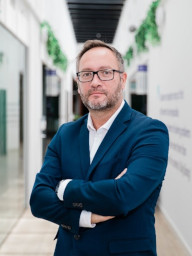
Abstract: Limiting global warming to 1.5°C, according to the United Nations Framework Convention on Climate Change (UNFCCC) Paris Agreement’s goal, unfortunately appears as a race against time that we have no choice but to win. This means finding the global solutions to reduce emissions by 45% by 2030 and reach net zero by 2050. While ICT industry is credited between 1.4% up to 5% of GHG (Green House Gas) emissions, connectivity improvement and Artificial Intelligence (AI) are also perceived as most promising enablers for strong carbon indirect abatement. By accelerating digitalization/decarbonization via massive IoT, 5G connectivity is seen as being capable of cutting 20% of EU total annual emission by 2030. While 6G definition is being debated, and Sustainability Development Goals (SDG) from United Nation (UN) playing a key foundational role with keeping engineers and researchers well focused onto central benefits for the society, its commercial roll-out will happen only after 2030, thus not in time for the 45% reduction target. On the other hand, major mobile operators (representing more than 30% of worldwide traffic) have committed to reduce their global emission by 45% by 2030. As a consequence, we will take this opportunity to review the most 6G promising technologies, but also 5G more mature ones that could be deployed in different Vertical Markets, to accelerate and secure a technology path towards 2030, but also towards net-zero emission by 2050 (benefiting from 6G), keeping in mind AI as a catalyst. A special attention will be paid to Smart Cities, which represent 70% of GHG emissions, while 60+% of worldwide population will be living in cities by 2030. Last but not least, this is also a wake-up to all engineers and researchers, from the bottom to the top, to play a vibrant role through Innovation and Science, during this next critical decade.
Bio: Dr. Thierry Lestable is the Executive Director of the Digital Science Research Center (DSRC), which includes the Digital Telecom Dept. and the Digital Security Dept., while also acting as Executive Director for the Artificial Intelligence Cross-Center Unit (AIXCU), reporting to Chief Researcher Prof. Mérouane Debbah, within
the Technology Innovation Institute (TII) in Abu Dhabi. Previously, Dr. Lestable was Director, heading the e-Mobility & Automotive Business Department at Sagemcom, addressing challenges raising from Intelligent & Connected Vehicles to micro-mobility. He was member of the Steering Committee of the FIEV Federation, which represents Automotive Equipment Suppliers, where he promoted the benefits of AI for road safety. Prior to Automotive, he was heading the Industrial IoT Business Department, designing and manufacturing connected devices for the industry (Smart City, Smart Grid, …), rolling out LPWAN Networks worldwide. Earlier, as Head of IoT Business Development & Strategic Partnerships, he actively participated to the Launch of IoT LoRa™ Alliance, being granted the position of vice-chair for the Strategy Committee in June 2015, then from October 2015 till 2017 was the Vice-Chairman of the Alliance.
Dr. Lestable has 20+ years experience in the Telecom, Mobility and Energy industry, steering industrial innovation, from spark of ideas to prototypes, products, standards, and systems, rolling-out networks, while leading new business development, within organizations such as Alcatel, Samsung, and Sagemcom. He received an Eng. Degree from Supélec in 1997, and a Ph.D, in 2003 from Supélec/Paris Sud-Orsay. He is the author of 35+ international publications, 20+ patents, editor of 1 Wiley Book on Advanced Channel Coding, co-author in 2 Wiley Books on B3G/4G systems, was Telecom Expert for the European Commission, Eureka Cluster CELTIC, and the French National Research Agency (ANR). He was Chair of the M2M Expert Group in eMobility European Technology Platform. In 2010, Dr. Lestable was member of the Telecom Steering Committee of Systematic, a competitiveness pole, and created the IoT/M2M course in Supélec, where he was visiting lecturer for 7 years.
Thursday 8 September 2022, 11:00 – 12:30
Julien Colafrancesco, Director of Engineering, Qorvo, France
Talk title: Expanding UWB Potential Through AI
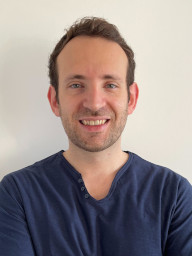
Abstract: Ultra Wide Band showed recent interest thanks to its outperforming capabilities for secure ranging, angle of arrival estimation and positioning, with very low cost, low power, and low footprint components. Beyond positioning, UWB can support radar applications, low latency short range communications, secure identification or payment application, etc. All these new applications are enabled by a thriving ecosystem made of standardization and research. In this keynote, we will recall the basics of UWB technology and present some key applications and standardization initiatives. Then, we will present how AI can be practically used into UWB applications and discuss future R&D challenges.
Bio: Julien Colafrancesco is Director of Engineering at Qorvo, Paris. He received his Master degree in computer science from UPMC & Telecom ParisTech in 2011 with a specialization in signal processing and his PhD in Sciences and Technologies of Arts in 2014. Julien Colafranesco has more than 10 issued patents and patents pending in
domains ranging from UWB-Localization to audio following and Natural Language Processing. Julien worked at several startups including Weezic, acquired in 2014 by Makemusic, and Sevenhugs, acquired in 2020 by Qorvo Inc. He is now Director of Engineering at Qorvo Paris.
George C. Alexandropoulos, National and Kapodistrian University of Athens (NKUA), Greece
Talk title: Full-Duplex MIMO Radios: From Efficient Spectrum Usage to Integrated Communications and Sensing
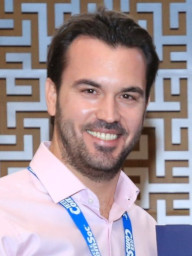
Abstract: The advent of the connected things paradigm within 5G mobile networks enabled various sophisticated applications, whose evolution paves the way for the notion of the connected intelligence of everything in 6G wireless communications. Recent speculations for this upcoming new generation push the 5G performance indicators to unprecedented levels, envisioning ultra-wideband operations in THz frequencies, devices with embedded sensing capabilities, and native AI. All these are expected to become a reality around 2030, and most predominantly, with a strong green footprint. In this talk, we will elaborate around the technology of full duplex radios, overviewing the evolution till its recent partial consideration in 3GPP Release 17 via the integrated access and backhaul paradigm, as well as detailing its promising simultaneous transmit and receive applications. We will discuss reduced-complexity transceiver architectures for mixed analog and digital self-interference cancellation in full duplex MIMO systems with both conventional and metasurface-based antennas, operating under realistic hardware imperfections, wideband channels, and up to THz frequencies. State-of-the-art applications of the presented transceivers for simultaneous data communication and channel estimation, direction-aided beam alignment and localization, as well as integrated sensing and communications will be presented, along with key open challenges and research directions.
Bio: George C. Alexandropoulos received the Engineering Diploma, M.A.Sc., and Ph.D. degrees in Computer Engineering and Informatics from the School of Engineering, University of Patras, Greece in 2003, 2005, and 2010, respectively. He has held research positions at various Greek universities and research institutes, as well as at the Mathematical and Algorithmic Sciences Lab, Paris Research Center, Huawei Technologies France, and he is currently an Assistant Professor with the Department of Informatics and Telecommunications, School of Sciences, National and Kapodistrian University of Athens (NKUA), Greece. He also serves as a Principal Researcher for the Technology Innovation Institute, Abu Dhabi, United Arab Emirates. His research interests span the general areas of algorithmic design and performance analysis for wireless networks with emphasis on multi-antenna transceiver hardware architectures, active and passive reconfigurable metasurfaces, full duplex radios, integrated communications and sensing, millimeter wave and THz communications, as well as distributed machine learning algorithms. He currently serves as an Editor for IEEE Transactions on Communications, IEEE Wireless Communications Letters, ELSEVIER Computer Networks, Frontiers in
Communications and Networks, and the ITU Journal on Future and Evolving Technologies. In the past, he held various fixed-term and guest editorial positions for IEEE Transactions on Wireless Communications and IEEE Communications Letters, as well as for various special issues in IEEE journals. Prof. Alexandropoulos is a Senior Member of the IEEE Communications, Signal Processing, and Information Theory Societies as well as a registered Professional Engineer of the Technical Chamber of Greece. He is also a Distinguished Lecturer of the IEEE Communications Society. He has participated and/or technically managed more than 10 European Union (EU) research and innovation projects, as well as several Greek and international research projects. He is currently NKUA’s principal investigator for the EU H2020 RISE‑6G research and innovation project dealing with RIS-empowered smart wireless environments. He received the best Ph.D. thesis award 2010, the IEEE Communications Society Best Young Professional in Industry Award 2018, the EURASIP Best Paper Award of the Journal on Wireless Communications and Networking 2021, the IEEE Marconi Prize Paper Award in Wireless Communications 2021, and a Best Paper Award from the IEEE GLOBECOM 2021. More information is available at www.alexandropoulos.info.
